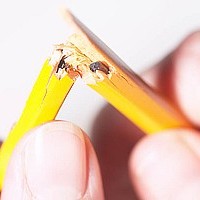
It is estimated that between 5 and 10% of all children have the symptoms of attention deficicit disorder (ADD) or attention deficit hyperactivity disorder (ADHD). Children with ADD have difficulty paying attention, following instructions and staying on task. They are easily distracted, forgetful and have difficulty organizing their lives. They tend to lose things and have difficulty following through on tasks. These symptoms become particularly evident in school.
The ADD child with hyperactivity (ADHD) is all of these things and more. They are impulsive, fidgety and always on the go. A seriously hyperactive child can create havoc both in their family and in the classroom. They tend to bring attention to themselves very quickly. They are often seen as major behavior and disciplinary problems. Though usually having good intentions, they often stay in constant trouble because of their lack of impulse control. More often than not they come to the attention of a pediatrician or a school psychologist and end up on medication.
Ritalin and other central nervous system (CNS) stimulants have proven to be generally effective in controlling the symtoms of ADD and ADHD. However, there is some controversy about the extensive use of these medications with children and adolescents. No doubt, they are over prescribed. Highly stressed classroom teachers and school administrators often pressure parents to get their children on stimulant medication, and the past decade has seen a dramatic increase in the use of these medications.
Concerned parents frequently ask my opinion about medication. Over the past thirty years I have worked with literally hundreds of children and adolescents who were on CNS stimulants. My impression is that they do far more good than harm. I have had children describe the medication as "the pill that helps me be good." Some are very aware that their academic performance is improved. Also, generally speaking these meds are safe and effective. If a child has an adverse reactions its fairly simple to either reduce the doseage or take them off it altogether. In most cases it is out of the body in about four hours. Usual adverse effects are: nervousness (anxiety), weight loss or being overly emotional. Some kids can be whiney and cry very easily.
At one time it was thought that adolescents outgrew the symptoms of ADD and ADHD around the age of 13 or 14. Sometimes that seems to be the case. However, it is now estimated that about one third of the of the children with ADD or ADHD grow up to be adults with the same symptoms. In the past decade, adults with ADD have become a much written about and discussed topic. It became a faddish sort of illness for the 1990s. However, it does seem to account for the seemingly irresponsible and erratic behavior of some individuals.
It is my own belief that many children diagnosed with ADD will grow up to be adults with diagnosable mood disorders. Most likely, they will be diagnosed with dysthymic disorder. There is some evidence that a deficiency of the neurotransmitters dopamine and norepinephrine underlies both disorders.
Children with ADD and ADHD need patient, supportive parents. The typical child with these disorders will be subjected to loads of reprimands and criticism, and after a while they start to become frustrated, angry and oppositional. They risk developing more serious emotional problems. However, this can be offset by parents who are patient and encouraging instead of being highly critical. Life for these children is not easy, but good parenting can compensate considerably for a misfiring nervous system.
All articles and other written material on this site are copyrighted by Carl Geo. Austin and can be reprinted for commercial use only by the written permission of the author.
Copyright © 2008 Carl Geo. Austin, all rights reserved.